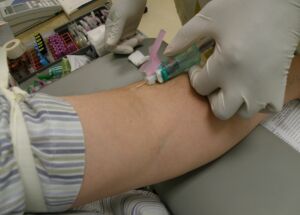News
Doctors cashing in on carrying out blood tests for the police
This article is more than 10 years old.
Hospital doctors accused of profiteering on blood samples taken for police officers during regular working hours

“This is gonna hurt the cops a lot worse than it’ll hurt me.” (Photo: Richardelainechambers)
Doctors working hospitals can earn extra cash by taking blood samples for police officers. Some officers have paid 2,000 kroner for basic blood tests they need as part of their work. Doctors are paid the fee on top of their regular hospital salary.
If an officer needs a blood test performed on, for example, a suspected drunk driver, the doctor will bill the cop.
In Frederikshavn and Aabenraa, DR Nyheder reported that individual doctors sent out invoices for as much as 2,500 dollars for a single blood test. The average price appears to be about 1,000 kroner per test.
Double-dipping
Spokesperson Bettina Jensen at Rigspolitiet, the national police force, expressed dissatisfaction that doctors are appearing to gouge police at the same time that they are getting paid to do their regular jobs.
“The situation, as it stands today, is terrible,” Jensen told DR Nyheder. “It is based on old, unwritten agreements. We want to make a standard deal that covers the entire country.”
Jensen said that it would be better for police to work with hospitals rather than individual doctors.
Take it or leave it
Police in northern Jutland have had little success finding a cheaper alternative for getting blood tests done.
“We think that 2500 kroner per blood test is too high,” Niculai Boelt Cîmpu, the economic head at north Jutland police told DR Nyheder. “The problem is that the agreement with Lægeforeningen, the Danish Medical Association, calls for suggested minimum rate, which, in principle, means that the doctors can charge what they want to for the blood sample, and it is then up to us whether we want to accept it.”
READ MORE: Capital region to audit hospitals after fraud scandal
Cops pay, on average, somewhere between 850 and 1500 kroner for a standard blood test, depending on the police district. The same test would cost about 300 kroner at a GP’s office.
Lægeforeningen blamed the higher price on “transport” fees and free enterprise.
“Blood samples taken for the police are not included in collective agreements for hospital staff physicians,” Lægeforeningen spokesperson Tue Flindt Müller told DR Nyheder. “It’s a free market, and the police may choose another doctor if they wish.”










































